Switch to the mobile version of this page.
Vermont's Independent Voice
- News
- Arts+Culture
- Home+Design
- Food
- Cannabis
- Music
- On Screen
- Events
- Jobs
- Obituaries
- Classifieds
- Personals
Browse News
Departments
Browse Arts + Culture
View All
local resources
Browse Food + Drink
View All
Browse Cannabis
View All
-
Business

Cannabis Company Could Lose License for Using…
-
Culture

'Cannasations' Podcaster Kris Brown Aims to 'Humanize'…
-
True 802

A Burlington Cannabis Shop Plans to Host…
-
Business

Judge Tosses Burlington Cannabiz Owner's Lawsuit
-
Health + Fitness

Vermont's Cannabis Nurse Hotline Answers Health Questions…
Browse Music
Browse On Screen
Browse Events
View All
Quick Links
Browse Classifieds
Browse Personals
-

If you're looking for "I Spys," dating or LTRs, this is your scene.
View Profiles
Special Reports
Pubs+More
Warning Shots: Burlington's Immigrant Community Seeks Solutions to the Gun Violence That Is Claiming Youths
Published November 2, 2022 at 10:00 a.m.
In summer 2003, as the United States began an ambitious effort to resettle displaced Somali Bantu people, the New York Times documented one family's relocation from a war-torn region in Africa to the desert city of Tucson, Ariz.
Its front-page article, "U.S. a Place of Miracles for Somali Refugees," featured photos of a Somali couple and two of their young children exploring an American grocery store, their toddler riding on mother Khadija Hussein's back. Through an interpreter, father Osman Yarrow told the Times there was something they desired more than Western conveniences and material abundance: safe harbor. He'd witnessed executions during Somalia's civil war and spent years at a refugee camp in Kenya, where the sound of bullets remained an unsettling din, the Times reported.
Finally, Yarrow said, "We will sleep without hearing gunshots."
The couple later moved their growing family to Burlington, where Yarrow worked as a cleaner. But the security they sought proved elusive. One of Yarrow's daughters alleged housing discrimination by a landlord who, she said, scared her children and told them to "go back to Africa," though a federal judge ruled against her. One of their sons was convicted last year of assaulting someone with a gun, and another son was convicted of aggravated assault for shooting a man in November 2020. Yarrow died that same year.
Last week, 19-year-old Abdiaziz Abdhikadir, Yarrow's grandson, was arraigned in Burlington on charges of first-degree murder in the fatal shooting of Hussein Mubarak, 21, in July in the Old North End. Abdhikadir is also charged with attempted murder for allegedly shooting into the home of Mubarak's family, fellow Somali refugees, earlier this year.
click to enlarge 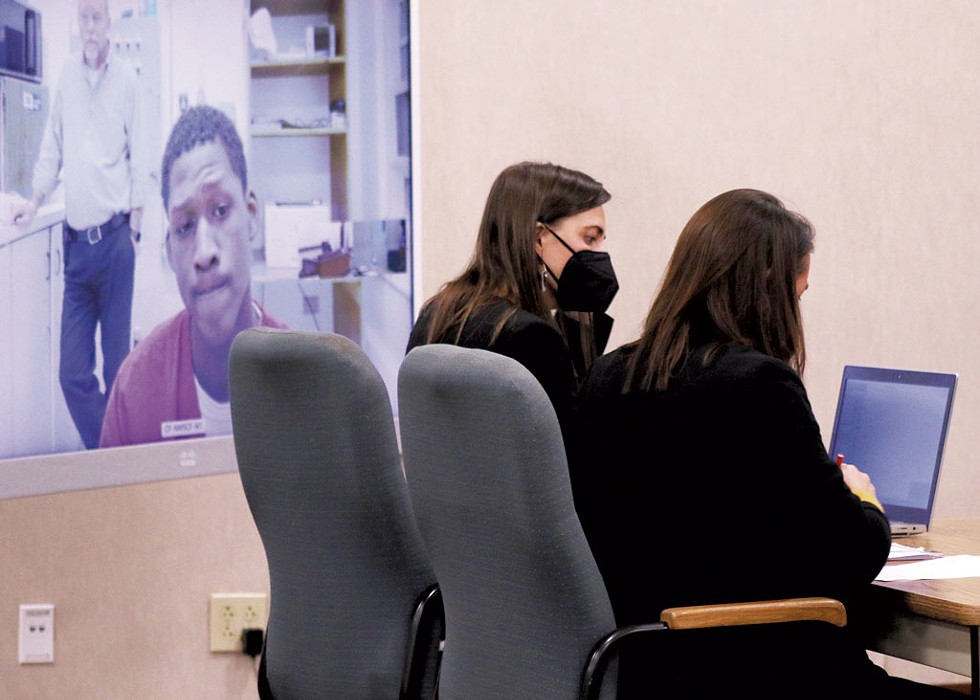

- Courtney Lamdin ©️ Seven Days
- Abdiaziz Abdhikadir appeared via teleconference at his arraignment last week. Seated: deputy state's attorney Sally Adams (left) and Chittenden County State's Attorney Sarah George
Mubarak's parents and siblings watched in grief as Abdhikadir pleaded not guilty by video from Northwest State Correctional Facility, where he has been detained since July. Abdhikadir's family was not in the courtroom. They had left Vermont before Abdhikadir's arrest to get away from him, Chittenden County State's Attorney Sarah George said. Seven Days could not reach them for comment.
Mubarak's killing and Abdhikadir's apprehension revealed a largely unseen dimension of Burlington's escalating gun violence problem. Amid an unprecedented spike in gunfire, families that came to Burlington to escape conflicts abroad are now losing children to violence in its endemic American form.
Since 2020, Burlington has tallied 51 gunfire incidents — when a weapon is fired in a criminal way, whether or not someone is struck. Police have connected 22 of these incidents to a small group of people, whom they've described only in general terms as young men with "amorphous" relationships. A review of public records shows that an outsize share of the alleged shooters and known victims come from immigrant families and communities of color. Seven of those facing criminal charges related to this gun violence were not yet 21 years old, meaning they couldn't legally buy a handgun in Vermont.
These youths have become entangled in a street life that includes drugs and petty crime, records obtained from police and court files show. Over the past several years, the scene has taken a more dangerous turn as young men, teens and some juveniles began arming themselves for protection and power. For some as young as 14, guns have become part of their social reality.
The surge of shootings is not unique to Burlington, or even within Vermont. Similar spasms are affecting smaller towns such as Bennington, where police have logged 18 gunfire incidents this year. Nationwide, shootings and murders have spiked after years of decline. The problem is multifaceted: Even if guns weren't in the hands of local youths, the amount of recent gunfire in Burlington would still be startlingly high. Nor is the violence limited to the new American community.
Amid that complexity, city officials have not called for a youth-centered response. And they've avoided discussing the involvement of immigrant youth, a detail Mayor Miro Weinberger said was not "particularly relevant" to share publicly and one he worried would fuel racist stereotypes, even as mug shots of young Black men have led newscasts with little context.
Officials have instead talked tough about holding offenders accountable, hoping the message would deter others from deciding to pull a trigger. Their push, relentlessly, has been for hiring more officers to the depleted department.
Some worry that the public safety panic is overshadowing deeper drivers of the uptick, including the chasms between police and vulnerable residents. Confronting the ways gun violence can ensnare youths of color offers a chance to curb further harm and keep more Black kids out of prison, Burlington High School dean of students LeVar Barrino said. But he said he understands why Burlington's largely white city leaders have been reluctant to do so: "The backlash is that they're going to be called racist."
But, Barrino added, "We're not going to make any progress if we can't get those people to lean into the vulnerability to put that out there."
Mubarak's death has already spurred leaders of the city's immigrant communities to act. They're planning meetings with families and looking for ways to address violence among new American youths. One such group, the Vermont New American Advisory Council, formed during the pandemic to improve civic engagement among immigrants and refugees but is turning its attention to gun violence. The group, of which Burlington City Councilor Ali Dieng (I-Ward 7) is a member, asked for and received $20,000 from the city in August to jump-start its work.
"This may be something that we could have prevented a long time ago that we did not see coming," Dieng said. "Now it's in front of us."
'Quickly Someone Has a Gun Out'
click to enlarge 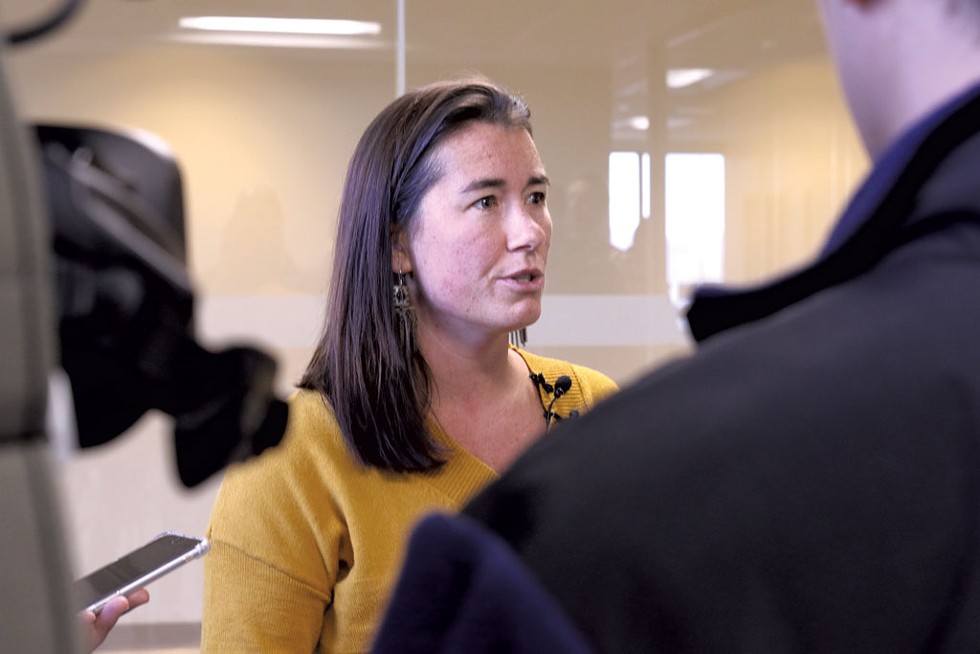

- Courtney Lamdin ©️ Seven Days
- Chittenden County State's Attorney Sarah George after Abdiaziz Abdhikadir's arraignment
Five 911 calls came in quick succession one afternoon in August 2020. At least 20 people, most of them teens, had surrounded a man at Buell Street and South Winooski Avenue in downtown Burlington, the callers reported. One of the assailants pulled out a gun and attempted to strike the man with it as the skirmish spilled into the street.
The group broke up when police arrived. The victim told investigators that the fight had been over drugs and he only knew his attackers by their street names. Police were able to apprehend one of them — Bonide Badibanga, then 18 — and arrested him for aggravated assault.
One witness to the beatdown and attempted pistol-whipping told police he'd "never seen anything like this in Burlington."
But experts say it's becoming more common for youths in and around the Queen City to brandish guns. The escalation has alarmed law enforcement and people who work with children.
"It seems that what was 10 to 15 years ago a fistfight, now quickly someone has a gun out," South Burlington Police Chief Shawn Burke said. He added, "It's so concerning from a societal standpoint that we've got these young people making these impulsive decisions."
Marshall Pahl, the state's chief juvenile defender, said it's not surprising that groups of young people are driving the spate of violence. Research shows that "emerging adults" — those in their late teens and early twenties — are prone to impulsivity and emotional swings that can lead to violence. They're also more likely to engage in risky behavior in the company of friends than alone.
Court records show numerous instances in which young people are using guns in the Burlington area in dangerous ways, even if they don't pull the trigger. In November 2020, two teenagers were accused of robbing a South Burlington hotel at gunpoint. One of those teens was later accused of pulling a gun on someone in a parking lot when the man confronted him about a stolen GoPro camera. Last summer, police said 20-year-old Kendall Liberty broke into an apartment carrying an AK-47 and aimed it at a 19-year-old woman. He pleaded guilty to a federal gun possession charge.
Still, the scope of the problem is difficult to ascertain. Young people involved in these incidents are often reluctant to speak to police, so affidavits may not represent a full accounting of a crime. Juvenile court records are sealed, and the people with access to them can't discuss cases due to confidentiality laws.
click to enlarge 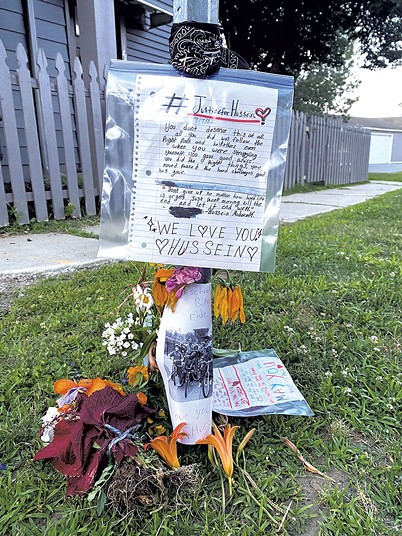

- File: Matthew Roy ©️ Seven Days
- A memorial where Hussein Mubarak was shot on Luck Street
Even state agencies that work with at-risk kids have limited access to data that could identify trends in youth violence. To fill the information gap, experts in Chittenden County meet regularly to share reports about delinquent youths and how to address public safety — particularly now that Woodside, the state's only juvenile detention center, has closed.
Aryka Radke, deputy commissioner of the Vermont Department for Children and Families, said young people have progressed from crimes such as retail theft to firearms offenses, citing reports compiled over the past two years.
"The concern is this indicates a normalization of carrying firearms or presenting as if carrying a firearm," Radke said in a statement to Seven Days.
Officials have largely avoided using the term "gang" when characterizing the youths' modus operandi. On the whole, those involved don't engage in turf wars over drug sales, though some do use or sell narcotics. And their relationships with one another lack structure or hierarchy. Instead of swearing fealty to a crew for life, members of this scene are part of overlapping social circles. Loyalties can shift.
At the same time, perpetrators are willing to exact revenge when an ally is wronged. Bonds are particularly strong in immigrant communities, State's Attorney George said.
"It does still lead to that same mentality of You're with me, or you're against me that gangs have," she said.
In court filings, a UVM police officer did describe Abdhikadir, Mubarak's alleged killer, as a member of a "gang" — a juvenile one. Court records show that Abdhikadir and his crew stole cars together, wearing surgical gloves to avoid leaving fingerprints behind. A number of them, Abdhikadir included, have been reported as runaways from state custody.
Two of the people who stole cars with Abdhikadir were accused of carrying out a brazen, targeted assault at the top of Church Street on a sunny morning in July. Wearing black ski masks, they shoved a man to the ground and pummeled him, ignoring bystanders who yelled at them to stop.
Before the cops arrived, the man got to his feet, climbed into a vehicle and drove away. The guys in the ski masks fled, too. One of them was 20 years old; the other, 14.
Customers at nearby Kru Coffee saw the whole incident unfold. Megan Munson-Warnken called 911 and recorded the attack on her cellphone.
"I watched 'The Sopranos,'" she said. "It definitely felt like I've seen it before."
Pulling the Trigger
During one week in August 2020, Burlington police responded to three different reports of gunfire: first during a large fight at Oakledge Park; then at a Plattsburg Avenue house, where someone shot into a bedroom; and finally at Leddy Park, where one of the victims fled into a stranger's home.
Some witnesses told police the incidents were part of the same feud, according to partially redacted police reports. One person told an officer that the dispute would continue "until someone was killed."
But officers were unable to make an arrest because almost none of the witnesses or victims would say much more. The police department put out a public plea for others to come forward to forestall "further escalation."
"Help keep your friends safe, if they won't help themselves," acting Burlington Police Chief Jon Murad said in a press release at the time.
In the two-plus years since, nearly 20 other gunfire incidents have involved an overlapping cast of combatants, targets and witnesses with links to people present at the trio of scenes, according to police. They have mostly targeted each other, but the violent behavior has proven contagious as more people have armed themselves for protection. There have been shoot-outs in parking garages and inside the University Mall in South Burlington.
Abukar Hilowle, 19, is accused of shooting a friend, possibly by accident, while the two were inside a car over the summer. Two days later, he allegedly shot and wounded two strangers on a downtown Burlington sidewalk after he claimed one of them used a racial slur. Security cameras captured the shooter wielding a 9mm pistol in each hand.
Despite their age, these young men haven't had trouble getting hold of handguns. Detectives traced two guns found at the scene of a July 2021 shoot-out at Simon's gas station on South Winooski Avenue: One had been reported stolen from a truck in Milton in 2019; the other, a 9mm Glock, had been taken just days earlier from the front seat of a car parked outside a house party in Montpelier.
The owner of the latter gun later told federal investigators he had been too embarrassed to report the theft. Federal investigators allege in court papers that a group of fellow partygoers, including Mubarak and 18-year-olds Badal Khadka and Aaron Dang, returned to Burlington with the gun.
The guns ended up in the hands of Burlington brothers Abdirahman Mohamed, 19, and Ahmed Mohamed, 22, police say. Both young men had been shot at, and in one case wounded, in 2020.
"Ahmed told me," a police officer wrote in an affidavit, "that after being shot, he is not afraid of guns anymore."
Targeted
Born at a refugee camp in Kenya, Mubarak was only 4 years old when his family resettled in Burlington. He grew up in the city, shaped in part by the gulf between American culture and his family's. His complicated childhood is described in court filings related to a 2021 federal drug conviction that caused him to spend most of his last year alive in prison.
His parents, devout Muslims, had trouble accepting some American practices, leading to conflict as their children became involved in life outside their immediate family, his federal public defender wrote in a memo to the judge. He saw older and younger siblings spend time in jail and DCF custody. By middle school, he began working at a grocery store to earn money for the family. Around that time, he started selling cannabis, too.
It's a set of experiences that Dina John, who immigrated to the U.S. from Kenya, understands. John, 22, a recent University of Vermont graduate who's running as a Progressive in the East District city council race, worked with Hussein for several years at a senior living facility in Shelburne. "His story is like a lot of BIPOC people growing up in Burlington," she said.
Adult responsibilities are often thrust on immigrant kids at young ages. When John was in elementary school, teachers asked her to help her younger brother learn his ABCs and translate during parent-teacher conferences.
A middle child who excelled at school and soccer, Mubarak "was the glue of the family," his older sister Hamara wrote in court papers. Many people knew him as both a friend and mentor. He was the first in his family to graduate high school and went to Plymouth State University in New Hampshire.
But he got in legal trouble there, soon dropped out and returned to Burlington, where he began selling cocaine. He was arrested and imprisoned for 10 months, a stint that left him "wanting to start life all over again," his sister told Seven Days after his death.
While Mubarak was locked up, Abdhikadir drove to the family's apartment on Riverside Avenue in February and fired a gun into the home from the sidewalk, authorities now allege. One of the bullets struck a Minnie Mouse backpack that was hanging on a wall.
The Mubarak children and Abdhikadir had known each other for years, but at some point their relationship deteriorated. Police believe Abdhikadir and Mubarak's younger brother were involved in a shooting at Roosevelt Park a month before Mubarak's death. The reasons for the animosity aren't entirely clear from court records. Mubarak had been out of prison for only a few days before he was killed.
The charges against Abdhikadir follow years of increasingly troubling behavior and recent violent outbursts. Court records describe an incident during summer 2021 in which his mother found a 9mm handgun in their house and hid it from Abdhikadir's younger siblings. Abdhikadir then smashed his mother's car windshield and punched holes in the walls of her apartment, court records allege.
Police believe Abdhikadir planned his attack on Hussein Mubarak. Prosecutors haven't charged any accomplices, but a detective's affidavit describes the ways police say Abdhikadir sought help from friends to cover up the killing. Even after a judge ordered him detained on an unrelated shooting charge, Abdhikadir appears to have continued to solicit his friends using the prison phone line, which is monitored by authorities.
In one call, he asked a friend for help shoring up an alibi, according to a transcript in court filings. The teen on the other end of the line is identified in the public records by the same initials and birth date as one of the teens from the ski-masked assault on Church Street in July. He's 14.
Arms of the Law
click to enlarge 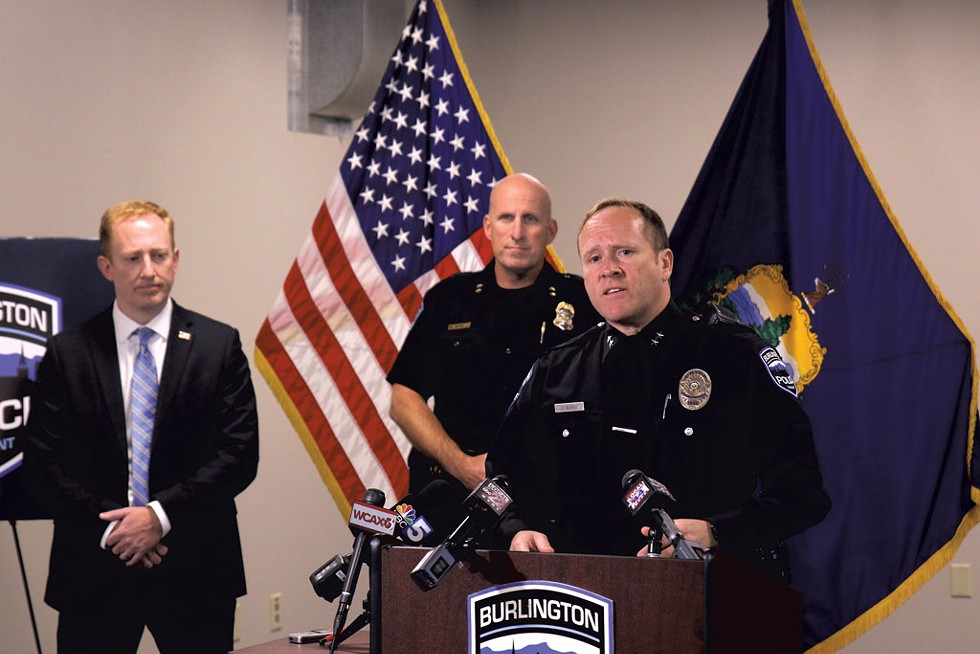

- File: Derek Brouwer ©️ Seven Days
- From left: ATF Resident Agent in Charge Alexander Schmidt, South Burlington Police Chief Shawn Burke and acting Burlington Police Chief Jon Murad
From an unmarked suite high in a downtown Burlington office building, six agents with the federal Bureau of Alcohol, Firearms, Tobacco and Explosives investigate the most serious gun-related crimes in the state. The resident agent in charge, Alexander Schmidt, is a UVM graduate and former Maryland state trooper who can speak about his work uninterrupted for 20 minutes, running through the nested points of a mental outline without losing his train of thought.
To explain one of his main ideas, Schmidt used a blue ballpoint pen to make an imaginary line across a glossy conference table.
"When you've crossed this line and you've pulled the trigger," he said, "that is a major, red-flag indicator that you're likely not going to stop."
The notion that gunfire breeds more gunfire is why Vermont law enforcement is prioritizing swift arrest and prosecution of shooters. "As quickly and efficiently as we can, how can we interrupt the cycle of violence? That's our obligation at ATF," Schmidt said.
Swamped with cases, the short-staffed Burlington police and several other Chittenden County departments joined with Schmidt's office over the summer to form a joint task force dedicated to gun violence.
The partnership brings a new degree of cooperation, intelligence sharing and investigative muscle to shooting cases, Schmidt said. It includes a pool of people who can respond to active scenes, as happened last month when Denroy Dasent, 52, allegedly killed two men in Burlington and South Burlington. Schmidt's office will soon acquire a $150,000 machine that can analyze ballistics fragments to identify connections between crime scenes. The federally administered system has not been easily accessible to Vermont police in the past.
Officials have been scrutinizing other barriers to holding shooters accountable. Vermont law makes it difficult to bring felony charges in gunfire incidents when nobody is struck or victims don't cooperate. Prosecutors can charge these cases as reckless endangerment, defined as conduct that could harm another person. But the offense is a misdemeanor, which prevents holding defendants without bail. Mayor Weinberger plans to lobby state lawmakers to make reckless endangerment a felony when it involves a firearm.
Though many incidents are still unsolved, Burlington police say they've made several significant arrests of young residents. Their "removal from the board," acting Chief Murad said at a recent press conference, "has decreased gun violence in that group."
Will successful prosecution of these young men bring an end to the problem? The person trying to convict them thinks not.
State's Attorney George is a leading advocate for criminal justice reform who has made her name by pushing for a more restorative and rehabilitative approach. She's supportive of state laws designed to move cases involving defendants age 21 and under into family court, where they are treated as juvenile offenders. When a young person is accused of shooting at someone, however, she has sought to prosecute them as adults and has asked judges to hold them without bail while the case is pending. Judges have almost always agreed.
Without suitable rehabilitation programs for young men who have committed violent acts, George sees incarceration as the only short-term option. But she's wrestling with how much prison time to seek. She said youths who spend time in prison are more likely to commit violent crime when they get out.
"I don't want these young people in jail," she said. "How do you balance that with also making sure the violence stops in the meantime?"
"I don't know the answer," George added, "which is scary."
One of the young men currently detained is Badibanga, who was charged in the August 2020 assault on South Winooski Avenue. In late 2021, Badibanga was accused of attempted murder for allegedly shooting at two of his brothers after his family confronted him about having a gun in their Old North End home. A "Free Brazii" campaign, which refers to Badibanga by a nickname, has since published statements attributed to Badibanga's mother, stating that she didn't know her cooperation with police would help put her son in prison. No one was wounded in the incident.
But family members have not recanted their initial statements, George said, and Badibanga's concerning conduct extends beyond what the public record shows.
The swell in young people facing prosecution for gun-related crime demands a comprehensive response that goes beyond arrests, according to Melo Grant, who serves on the city's Police Commission.
The citizen-led panel is charged with crafting police department policy and reviewing uses of force by officers. In recent years, the commission has made it a priority to address racial disparities in traffic stops and arrests.
"We're going to bring in ATF, and we're going to start hunting our kids? Because that's what's going to happen," Grant said. "We already [incarcerate] a ridiculous percentage of Black and brown people in Vermont. So we have these kids going through the Burlington school system and then ending up in jail. Why is that happening?"
She added: "No one wants to do the deep dive, and it's heartbreaking."
Looking Upstream
Back in 2015, Councilor Dieng started an outreach program within the Burlington School District to teach parents of immigrant students about aspects of life in America. Parent University, as it's called, covers practical skills such as financial literacy as well as essential street smarts. Dieng has brought in photos of cannabis, for instance, so parents know what the drug looks like in case their teen started bringing it home.
It hadn't occurred to Dieng, an educator who emigrated from Mauritania, that his America 101 curriculum should cover guns.
"I never thought it would come to this," he said.
Now, though, Dieng sees not talking to Burlington's immigrant families about gun violence as a missed opportunity to get ahead of the problem — one that community leaders fear won't be solved with prosecution alone. Reducing gun violence, they say, demands a broader effort that involves the people most affected by it and a willingness to confront the factors, including systemic racism, that keep them on the margins.
Dieng's group, the advisory council, is experimenting with ways to broach these topics. Starting in December, the group will invite at-risk youths to participate in a "restorative justice circle" with help from the Burlington Community Justice Center. Leaders of immigrant communities will speak at town hall-style events about the impacts of gun violence, and therapists will help families process the trauma inflicted by gunfire.
The issue is difficult to discuss publicly. Several members of the immigrant community either didn't respond to Seven Days' interview requests or declined them; one person explained through a third party that the trauma of recent shootings was too fresh. Leadership at the Boys & Girls Club of Burlington, which works closely with new American youths in the Old North End, didn't respond to several interview requests.
Aden Haji, an advisory council member and Somali immigrant, said Mubarak's death and other shootings have taken a toll on his community. Families need mental health services to help break down generational divides that create tension in immigrant households, Haji said.
"It's unfortunate a loving member of our community had to pass away before we can start having this type of conversation," he said, "[but] it did open a lot of people's eyes."
Yacouba Jacob Bogre, executive director of AALV, said he thinks many of the city's immigrant families want to help come up with solutions; some of the families who were directly impacted by the shootings have already come to AALV for assistance.
The organization, which operates youth and family programs, is planning to meet with each of the area's ethnic communities before the year's end to hear their ideas. Bogre suggested that Burlington might also learn from other, larger cities that have more experience grappling with youth violence in immigrant communities.
Bogre said he thinks it's important that no one group — or Burlington's immigrants as a whole — be blamed for the city's gun violence. "It's a community issue," he said.
Immigrants can't be expected to address the issue alone, said Mercedes Avila, a UVM pediatrics professor who studies health disparities. She said the involvement of new American youths in street violence shouldn't be surprising, because they face barriers accessing systems that don't do enough to accommodate non-English speakers or people from other cultures.
"It's all connected to how disconnected, in a way, young people feel in our communities," she said.
Data have consistently shown significant racial disparities in outcomes that Black youths face when they encounter police and the juvenile justice system. Those ages 17 and under comprise just 16 percent of the student population but accounted for 44 percent of all youth arrests in the city during a three-year period ending in 2019, according to state data. Black youths ages 18 and 19 accounted for 24 percent of arrests in the same period.
Experts have increasingly looked to schools as drivers of racial disparities. A state youth violence prevention council, of which Avila is a member, recently began funneling some federal funds to Burlington school-based programs. District leaders said they're moving away from conventional forms of punishment such as suspension, a recognition of data showing a close link between racially disproportionate discipline and legal trouble for kids down the line. The district also ended its uniformed school resource officer program — to acting Chief Murad's chagrin — in favor of more approachable authority figures.
Barrino, the new dean of students, plays a key role in the district's efforts. A charismatic New Yorker who wears jeans and a flat-brim hat, Barrino is trying to earn the trust of at-risk students so he can help intervene in conflicts. He brings to the work nearly two decades of experience working at the Boys & Girls Club of Burlington. He became such a fixture in the neighborhood that his portrait now figures prominently in a mural at Roosevelt Park.
Barrino sees how easily arguments can bubble up, with social media being a primary accelerant. Conflicts related to race or ethnicity can become cultural minefields that Barrino, his staff and the district's multilingual liaisons try to navigate and defuse before they get violent. Two weeks ago, Barrino brought together 15 people in the African and Nepali communities to mediate a beef between two students. The meeting de-escalated the situation, Barrino said.
"It doesn't always happen, but when we catch one, it feels awesome," he said. "Hopefully this will slow it down."
Shabnam Nolan, executive director of the King Street Center, said prevention work needs to target kids when they're young, before they're drawn to the streets. Nolan said kids first come to King Street in preschool so that, by their early teens, the center feels like their second home. They stay engaged because they help design the center's programs: This year, Burton Snowboards' Chill Foundation is teaching kids how to build skateboards; others are learning to play tennis with Jake Agna, a local pro.
But one of King Street's most popular programs is its lemonade stand. A mainstay on the Church Street Marketplace every summer, the stand gives teens an opportunity to socialize and earn some cash — an alternative to selling drugs. Nolan knows of few other hands-on career-development programs in the area.
The spike in gun violence demands a hard look at programming gaps and how to close them, Nolan said. That means identifying and addressing the root causes of youth violence — not an easy task, but one Nolan said is the community's collective responsibility.
"No child just wakes up and says, 'Today I'm going to pick up a gun.' There's a whole history there that leads up to that moment," Nolan said. "We need to focus in on why."
Got something to say?
Send a letter to the editor
and we'll publish your feedback in print!
Tags: Crime, Seven Days Aloud, Burlington, Crime, violent crime, gun violence, Video
About The Authors

Derek Brouwer
Bio:
Derek Brouwer is a news reporter at Seven Days, focusing on law enforcement and courts. He previously worked at the Missoula Independent, a Montana alt-weekly.
Derek Brouwer is a news reporter at Seven Days, focusing on law enforcement and courts. He previously worked at the Missoula Independent, a Montana alt-weekly.

Courtney Lamdin
Bio:
Courtney Lamdin is a news reporter at Seven Days; she covers Burlington. She was previously executive editor of the Milton Independent, Colchester Sun and Essex Reporter.
Courtney Lamdin is a news reporter at Seven Days; she covers Burlington. She was previously executive editor of the Milton Independent, Colchester Sun and Essex Reporter.
Latest in Crime
Speaking of...
-

Haymaker Bun’s New Burlington Café Packs a Punch
Jul 23, 2024 -

Crumbs: Restaurant Transitions in Chittenden County and St. Johnsbury
Jul 16, 2024 -

Burlington Will Vote on Police Oversight Measure in November
Jul 16, 2024 -

Supreme Court Clears the Way for Higher Ground to Move to Burton Campus
Jul 15, 2024 -

Jessica Brown Appointed as Burlington City Attorney
Jul 10, 2024 - More »

























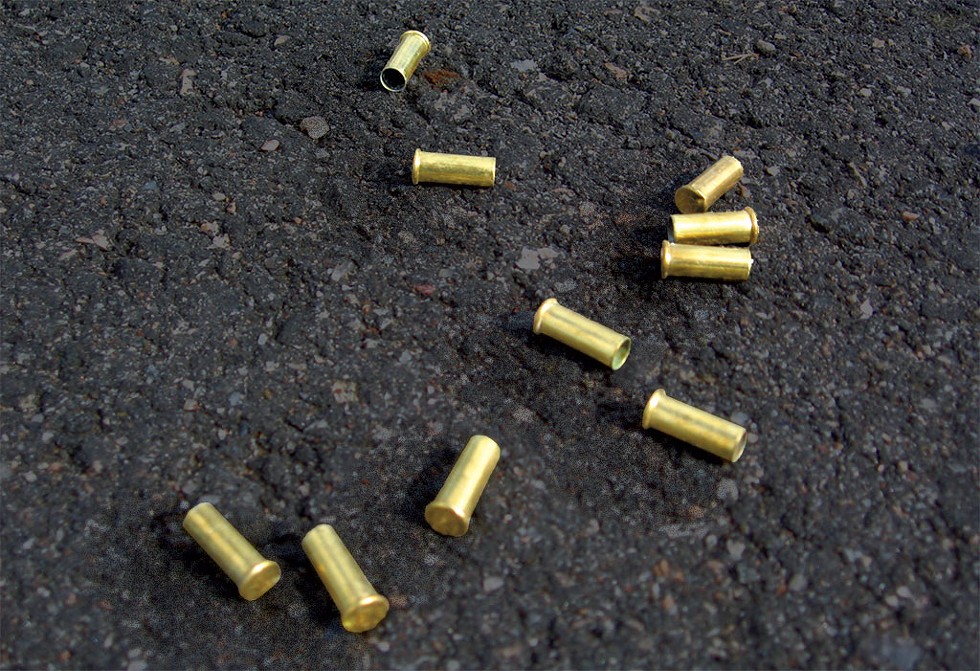
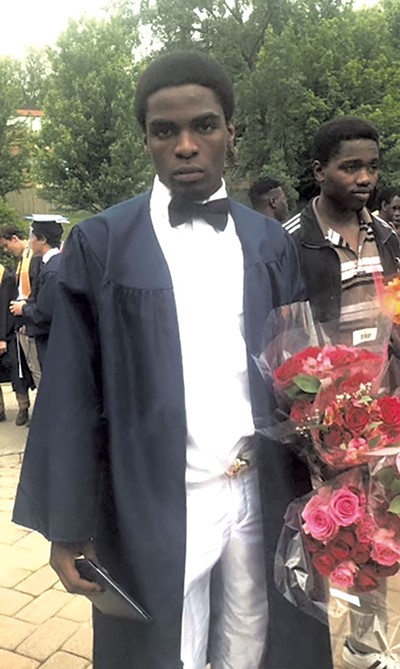
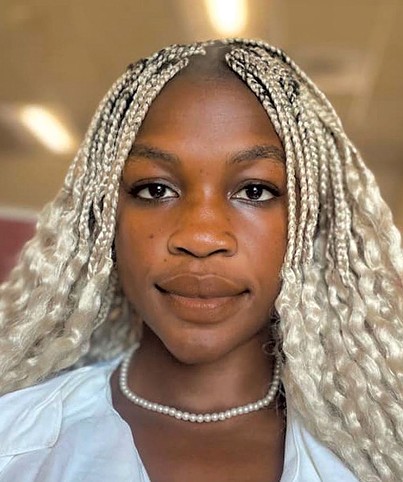
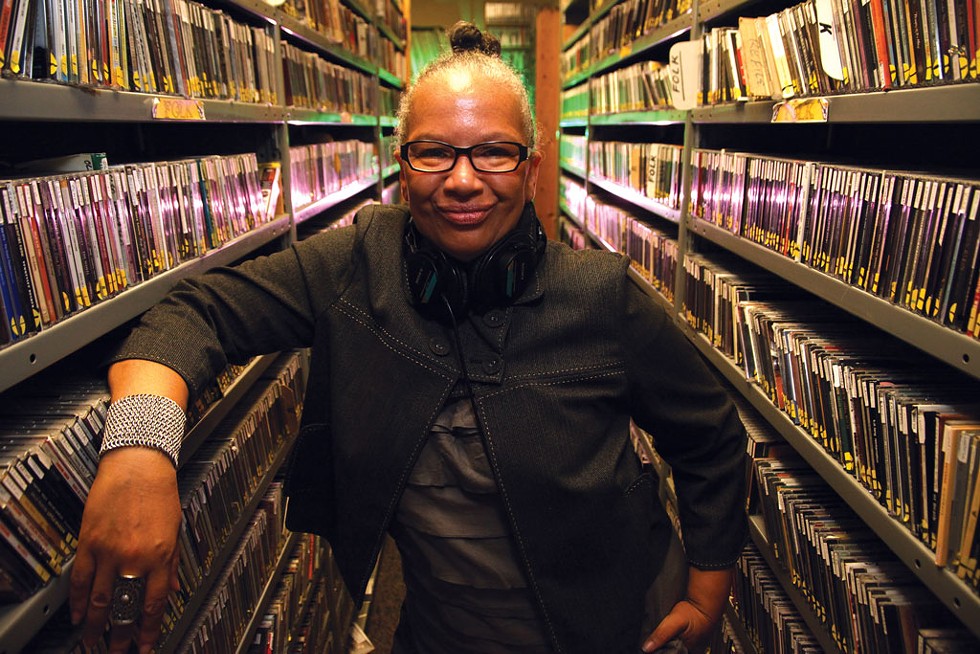
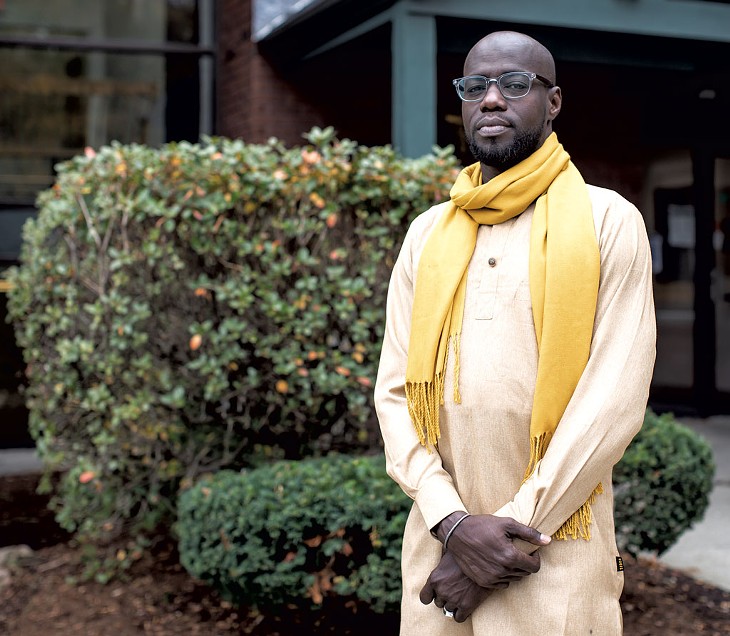
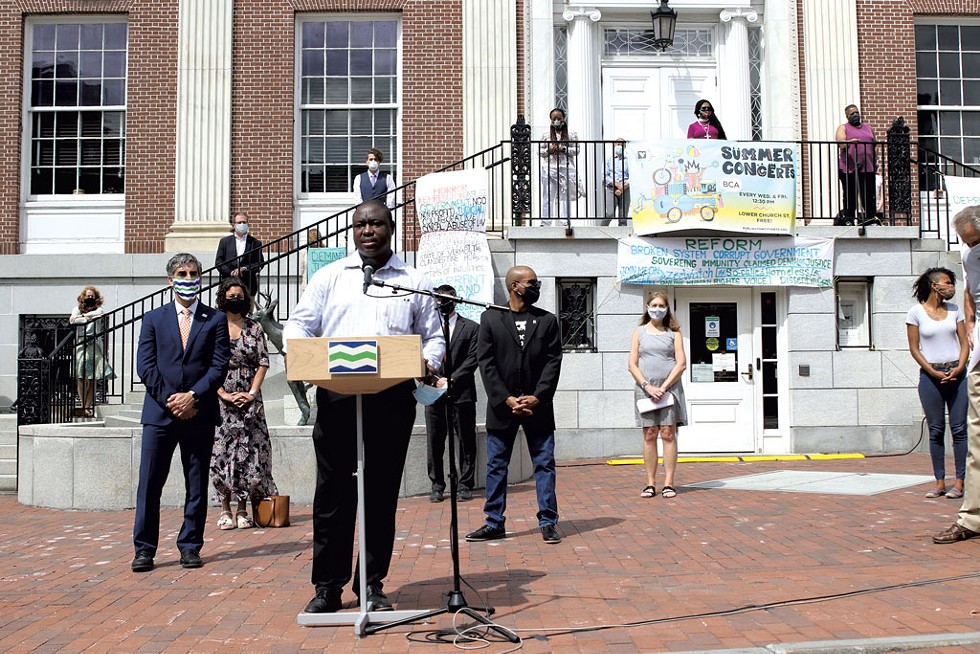
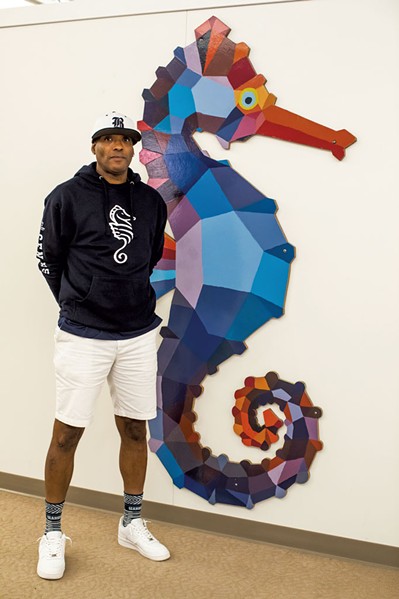
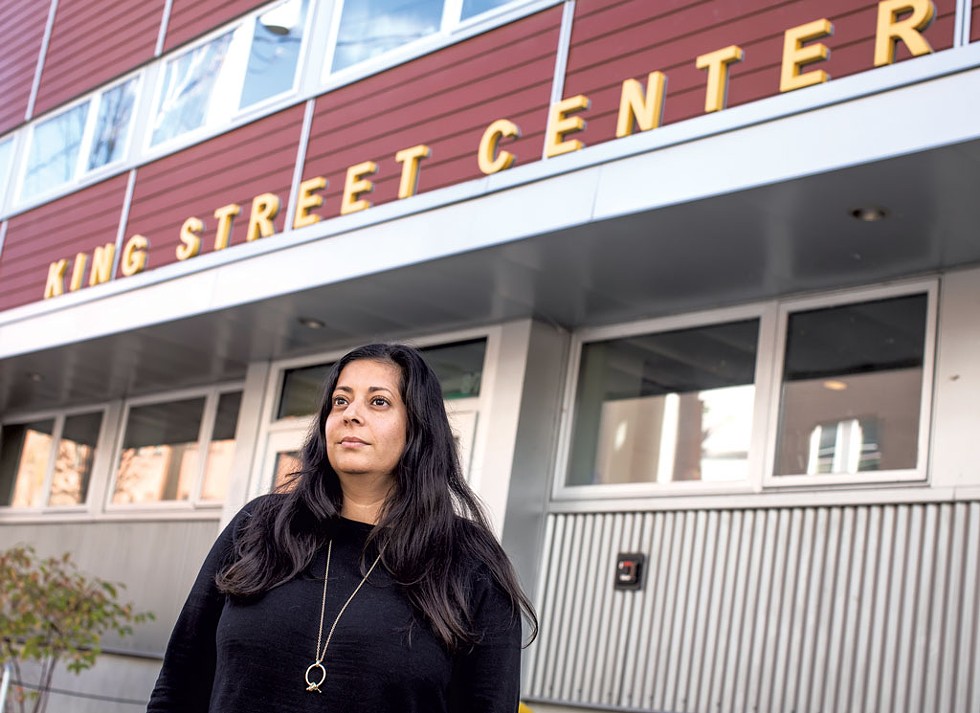


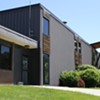




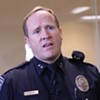
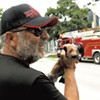
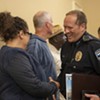
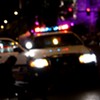
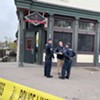
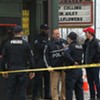
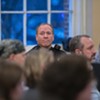



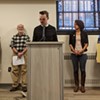




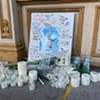








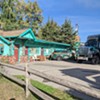


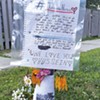
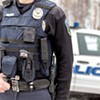


find, follow, fan us: